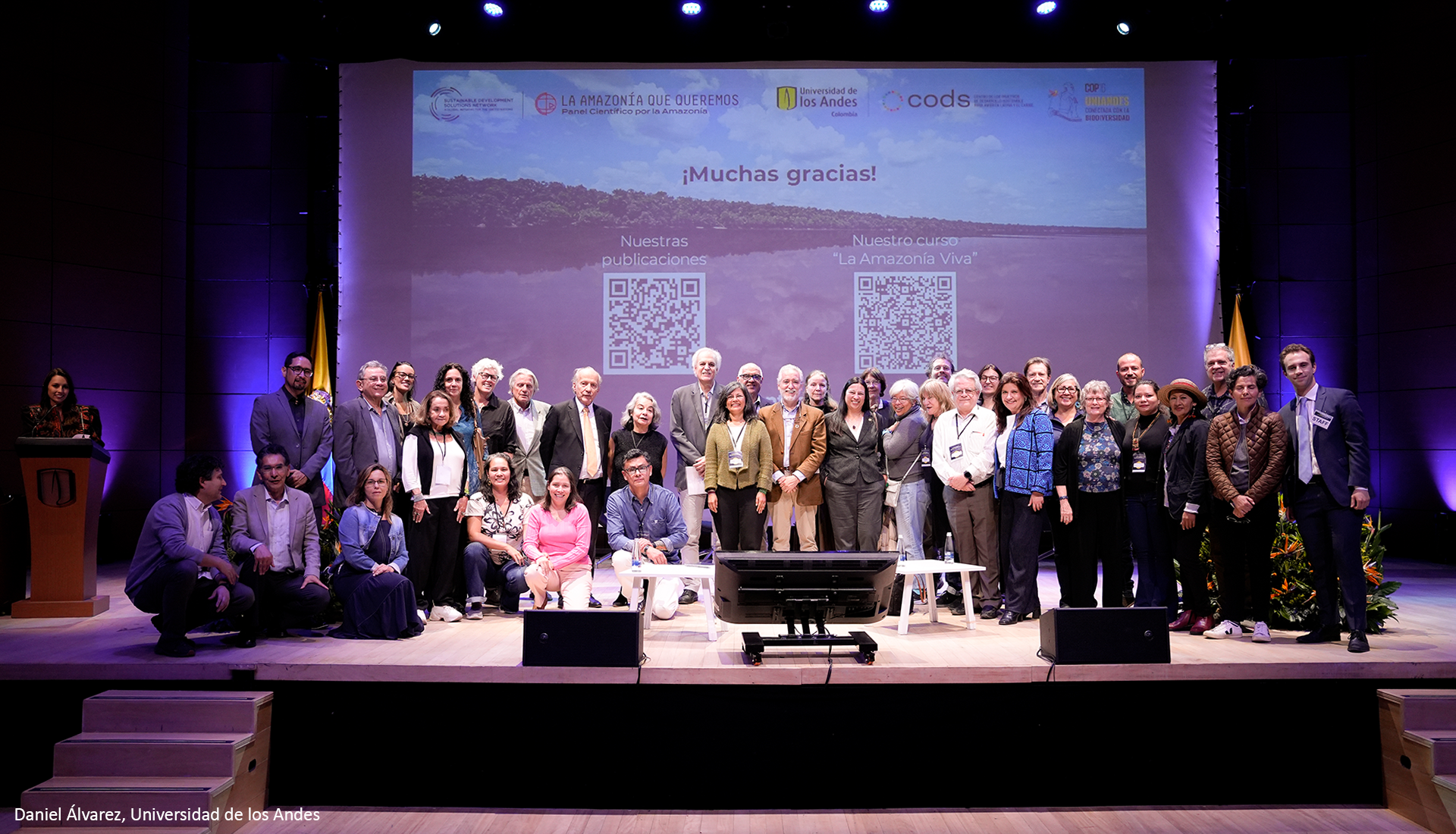
The Science Panel for the Amazon (SPA) hosted alongside the Center for Sustainable Development Goals for Latin America and the Caribbean (CODS) of the Universidad de los Andes, a high-level event open to the public called “A Dialogue on the Amazon We Want”. The event took place on the morning of April 17th, 2024, at the Mario Laserna Auditorium in Bogotá, Colombia.
The opening of the event was led by Juan Camilo Cárdenas Campo, CODS Director, Carlos Nobre, SPA Co-Chair, and Marielos Peña-Claros, SPA Co-Chair. Professor Juan Camilo Cárdenas discussed the importance of communication regarding scientific work, particularly about ecosystem protection, focusing on the challenges faced in the Amazon. He highlighted the campaign: “Adopt an SDG for a day” to raise awareness about the Sustainable Development Goals (SDGs), many of which intersect with Amazonian issues.
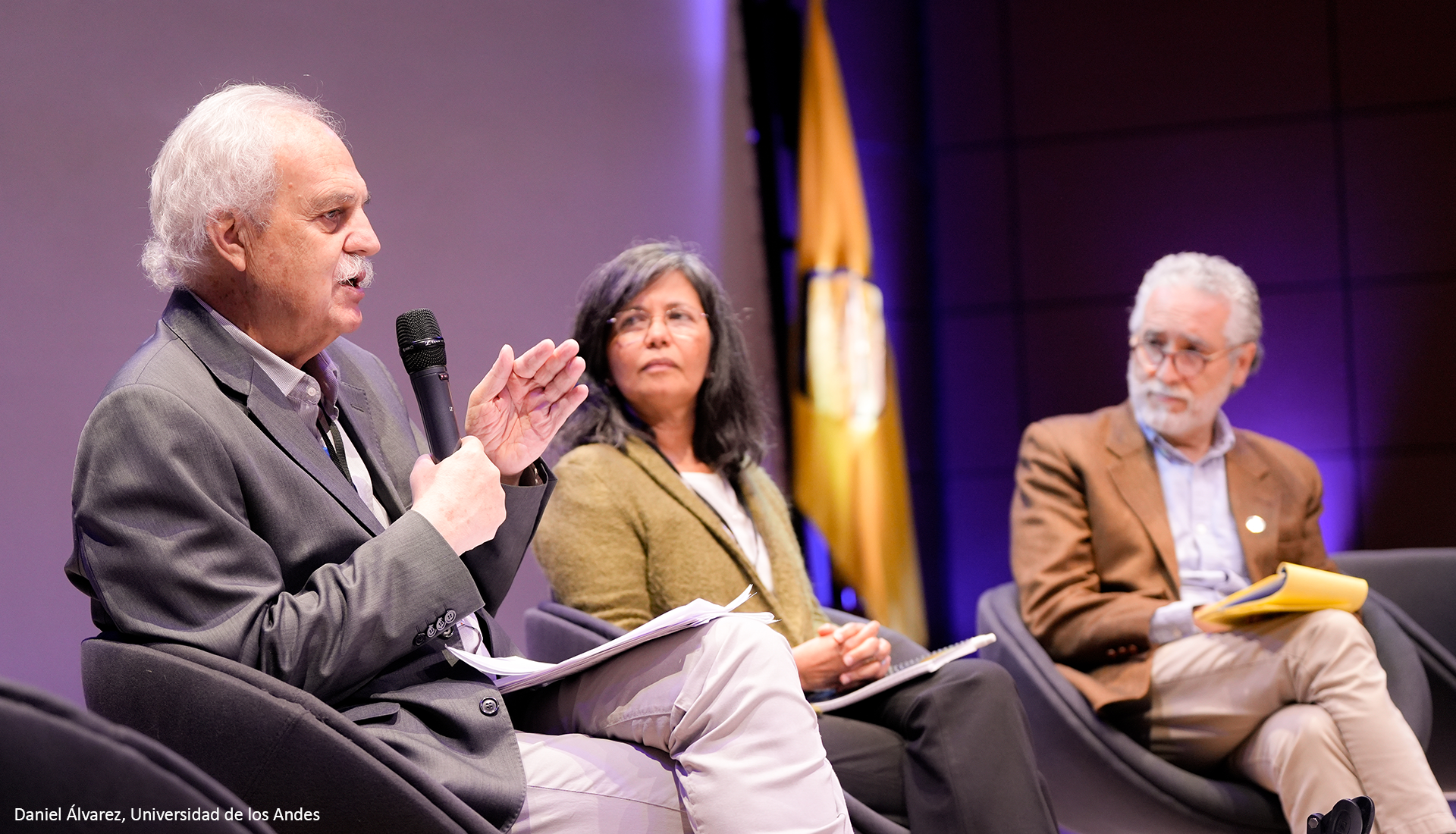
Dr. Carlos Nobre, elaborated on the history of the SPA, convened under the auspices the Sustainable Development Solutions Network (SDSN). He emphasized the urgent need to address deforestation and promote nature-based solutions in the Amazon. Marielos Peña Claros, underscored the importance of connectivity and conservation in envisioning a sustainable future for the Amazon, emphasizing the need for collective efforts and innovative solutions.
Ms. Susana Muhamad, Colombia’s Minister of Environment and Sustainable Development, delivered the keynote speech and emphasized the critical interdependence between the Andean and Amazonian regions and the urgent need to safeguard it. She stressed the imperative of taking immediate action to strengthen the cultural and political ties between these regions to preserve water cycles and ensure the well-being of populations, especially with 80% of Colombia’s Andean forest already lost to deforestation.
Muhamad’s call extended beyond merely “saving the Amazon,” to averting its imminent collapse, stressing the necessity of coordinated regional efforts, both politically and practically, to address the biome’s challenges. She advocated for policymaking grounded in science and ancestral knowledge of the region, encouraging discussions on bioeconomy to originate from the territories and their people, questioning their alignment with international extractivist markets’ demands.
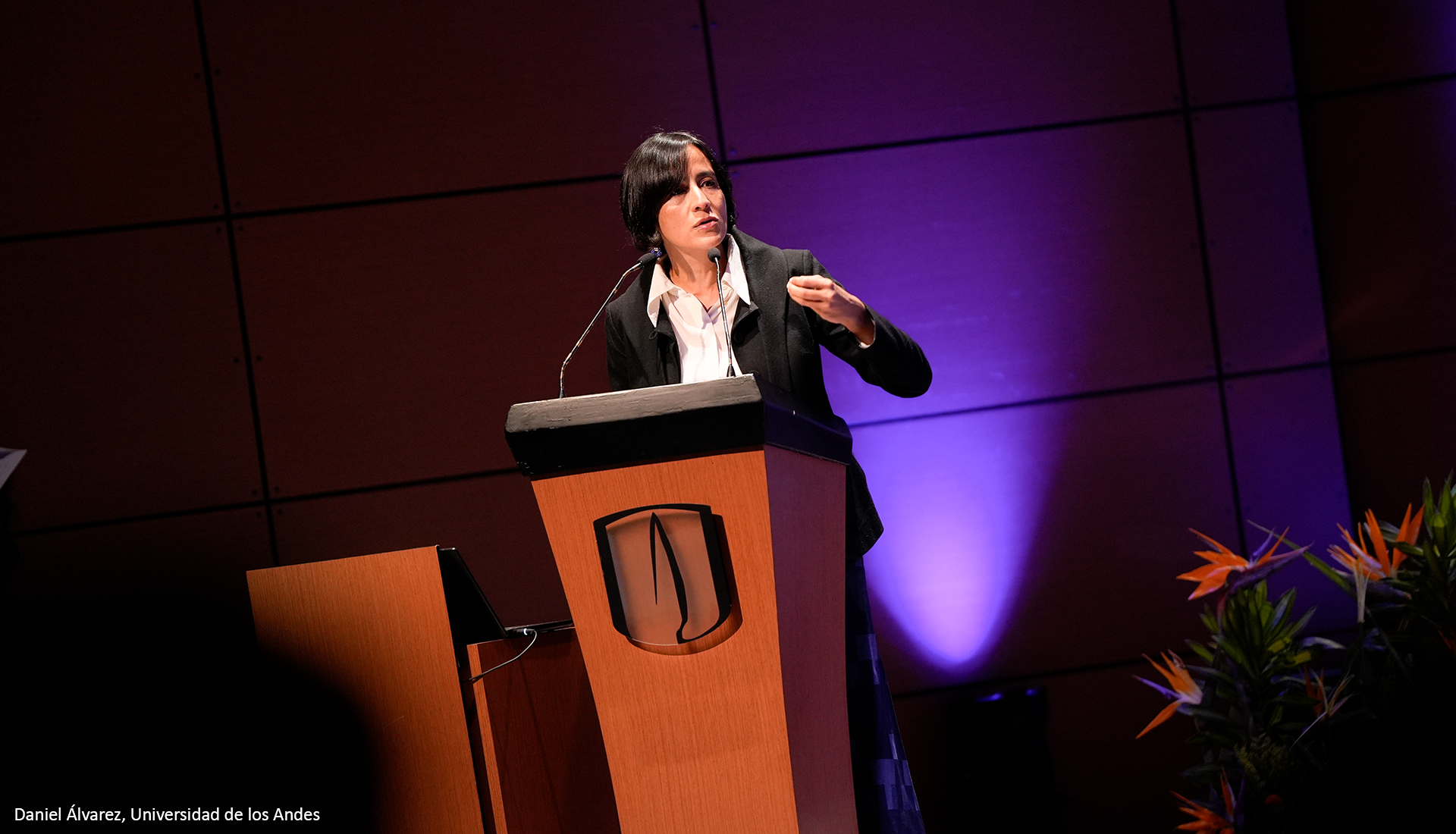
Highlighting the significance of COP16 in Cali, Colombia, later this year, Ms. Muhamad underscored the pivotal role of the Amazon in the intersection of biodiversity and climate agendas. She emphasized the vital involvement of indigenous peoples and local communities in biodiversity conservation, proposing a dedicated panel between Western scientists and Indigenous communities at the conference. Moreover, she stressed achieving “Peace with Nature,” the COP16 slogan, understanding the various conflicts hindering socio-environmental crisis resolution, and viewing Amazon reconstruction as a process of peace-building and social fabric restoration through nature conservation. Emphasizing the centrality of human rights in environmental actions, she asserted that nurturing the natural environment fosters peace amid multiple conflicts.
In concluding, Ms. Muhamad reiterated the Colombian government’s commitment to collaborating with science and communities in protecting and restoring the Amazon, recognizing it as a nexus between climate and biodiversity agendas.
After the Minister’s inaugural speech, the event continued with the first-panel discussion, which focused on deforestation and degradation in the Amazon, aiming at identifying priority areas and possible scientific contributions of the SPA to achieve zero deforestation by 2030. This dialogue was moderated by Manuel Rodríguez-Becerra (Universidad de los Andes), and included interventions by leading experts in the field: Maria Soledad Hernández Gomez (SINCHI Institute), Omar Franco Torres (Cómo Vamos National Parks), Dolors Armenteras (Universidad Nacional de Colombia – SPA Author), Carlos Rodríguez (Tropenbos – SPA Author), Carlos Daniel Cadena Ordoñez (Universidad de los Andes) and Alejandra Laina (WRI Colombia).
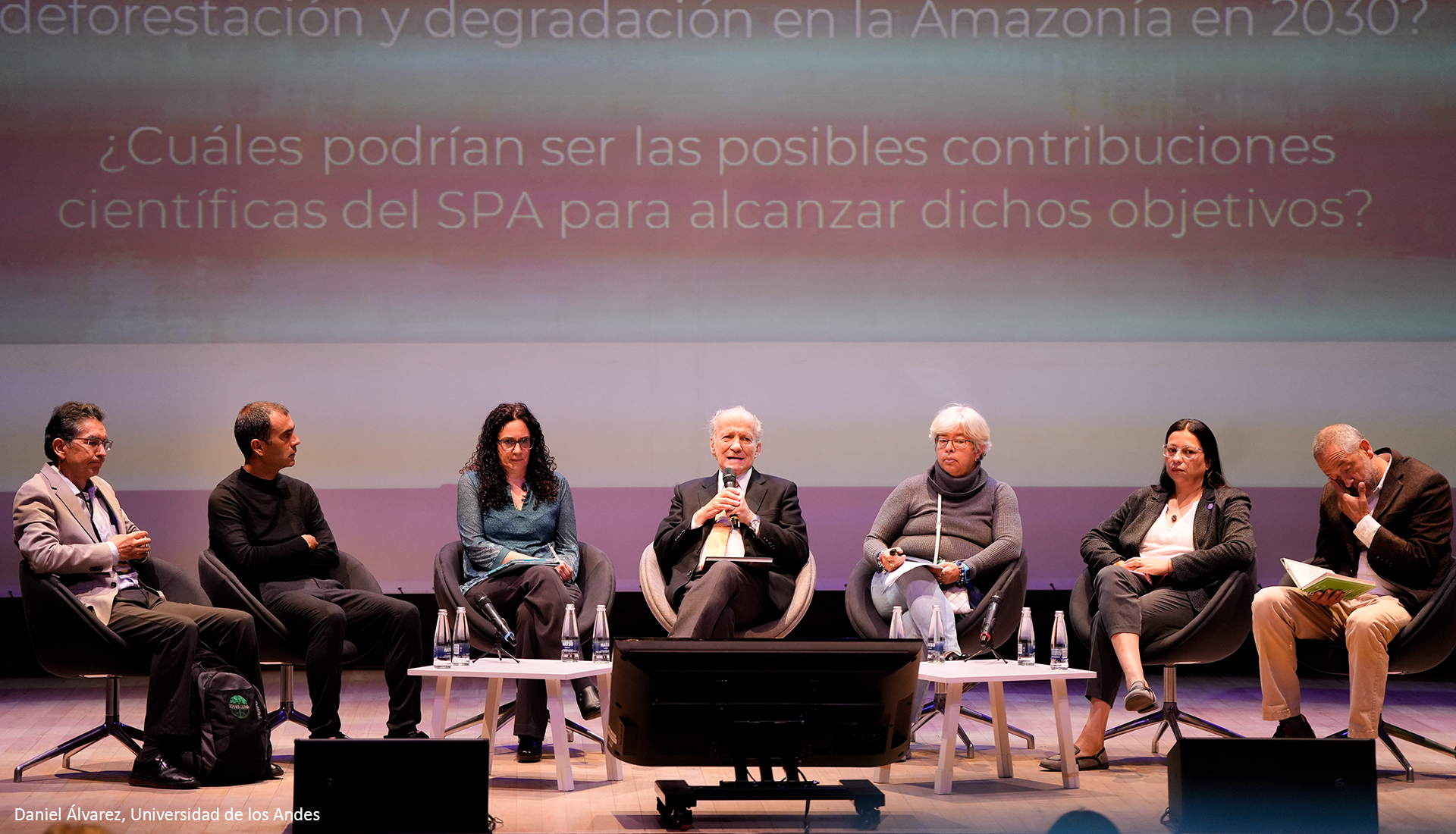
In her intervention, María Soledad Hernández Gómez emphasized the need for research programs focused on water management and biodiversity in key areas like Guaviare, Meta, Putumayo, and Caquetá. She highlighted the importance of participatory restoration and community governance. Omar Franco Torres discussed the threats to national parks from deforestation, particularly due to activities like cattle ranching. He called for coordinated efforts across sectors to manage territories effectively, including strategic investment planning.
Dolors Armenteras, stressed the importance of long-term scientific research to anticipate and address deforestation and degradation. She emphasized the need for restoration efforts at all scales and the translation of scientific knowledge for effective action. Carlos Rodríguez focused on participatory restoration and the importance of conserving biodiversity in the Amazon. He highlighted the role of indigenous knowledge in restoration efforts and the need for greater investment in forest conservation.
Carlos Daniel Cadena Ordoñez highlighted the long-term ecological processes that sustain Amazonian biodiversity and emphasized the need for restoration efforts to prioritize preserving genetic diversity. Alejandra María Laina Agudelo emphasized the importance of connectivity between Andean and Amazonian ecosystems and the need for collaboration among stakeholders. She called for inclusive approaches to decision-making and the democratization of scientific information.
During their group discussion, panelists reiterated the importance of community involvement, interdisciplinary collaboration, innovative financing mechanisms, and the translation of scientific knowledge for effective conservation efforts in the Amazon. They also highlighted the urgent need for policies and actions to address deforestation and degradation.
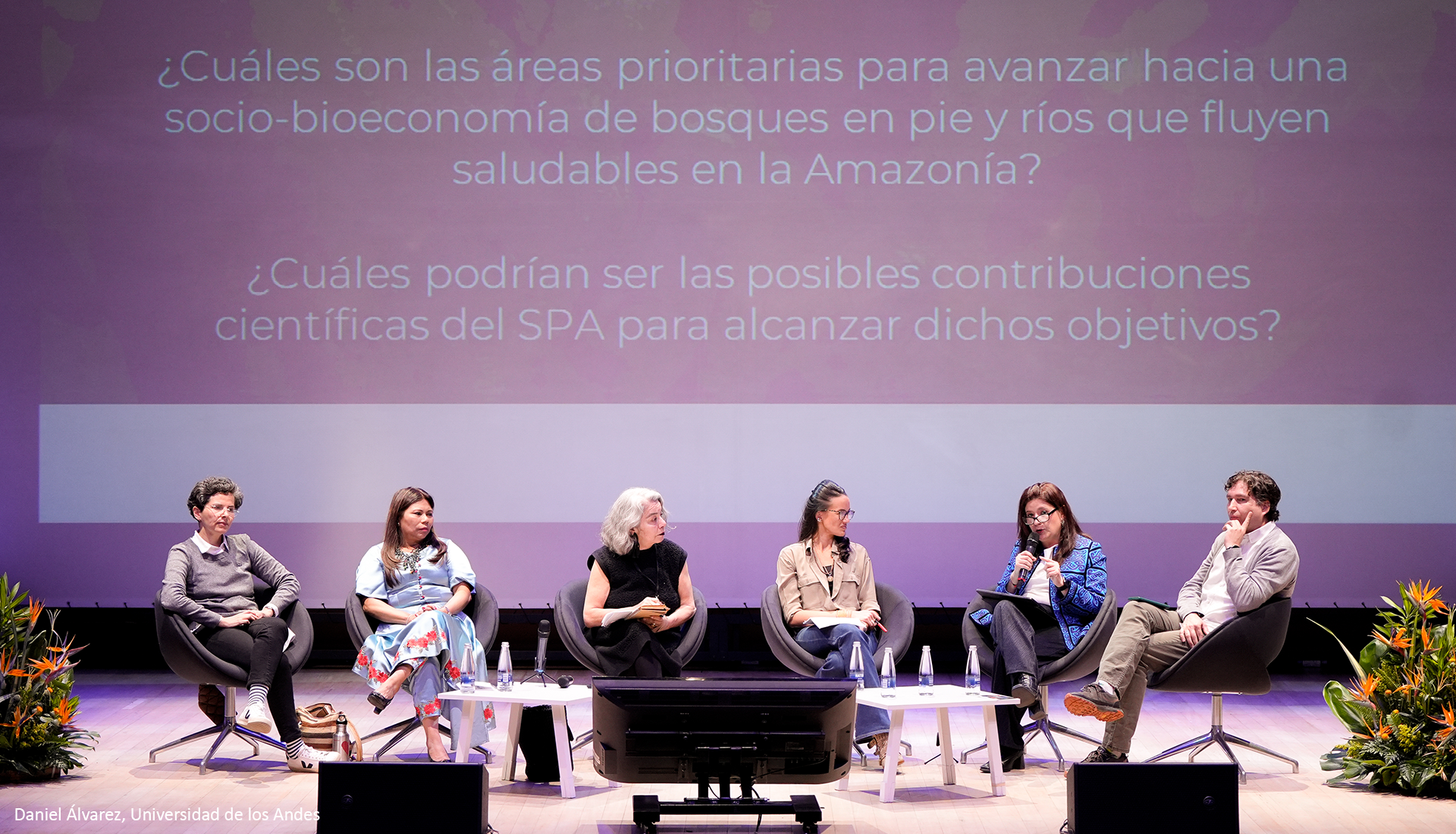
The second panel was moderated by Emma Torres, SPA Strategic Coordinator, and addressed the socio-bioeconomy of healthy standing forests and flowing rivers in the Amazon. This conversation included the participation of Fany Kuiru Castro (COICA), Hernando García Martínez (Alexander von Humboldt Institute), Sandra Valenzuela de Narvaez (WWF Colombia), Mariana Gómez Soto (Gaia Foundation) and Carolina Gil (Amazon Conservation Team).
The panelists presented a rich tapestry of perspectives on the socio-bioeconomics of the Amazon, each emphasizing different facets of the region’s complexities and challenges. Fany Kuiru Castro articulated the importance of Indigenous economies, highlighting the need for legal security for indigenous territories and the revitalization of traditional knowledge systems. She underscored the critical role of Indigenous peoples in protecting and caring for the Amazon, advocating for inter-scientific dialogues to integrate indigenous knowledge with Western science.
Sandra Valenzuela de Narváez emphasized the value of traditional community management and knowledge systems in shaping sustainable socio-economies. She advocated for a comprehensive approach that integrates environmental, social, and economic considerations, emphasizing the need for policies and programs that respect the dignity of local populations and promote the health of forests and rivers. Hernando García Martínez echoed the call for diverse approaches to the bioeconomy, recognizing the multiple realities within the Amazon region. He stressed the importance of valuing the Amazon for its intrinsic value to humanity. He also called for greater scientific sovereignty in bioprospecting efforts.
Mariana Gómez Soto highlighted the importance of safeguarding connectivity in the Amazon and promoting local Amazonian economies based on indigenous governance and management systems. She emphasized the cultural, ecosystemic, and rights-based principles that underpin these economies and called for relevant land-use planning instruments that recognize and respect local priorities. Carolina Gil emphasized the need to pause and reflect on the livelihoods of the people living in the Amazon. She underscored the vital relationship between these communities and their territories, advocating for a deeper understanding of local relationships and the diverse ways in which people and nature interact in the region.
Together, these interventions underscored the importance of adopting a holistic approach to the socio-bioeconomy of the Amazon, one that respects Indigenous knowledge, promotes sustainable management practices, and recognizes the connectivity between human and ecological systems.
“A Dialogue on the Amazon We Want” underscored the critical interdependence between the Andean and Amazonian regions, emphasizing the urgent need for coordinated regional efforts to address challenges. From advocating for indigenous economies to promoting sustainable management practices and restoration initiatives, the discussions showcased diverse perspectives united by a shared commitment to holistic approaches, collaboration, and engagement with local communities. Recognizing restoration as a pillar for combating deforestation and degradation while promoting socio-bioeconomies, the event served as a pivotal platform for amplifying diverse voices, fostering dialogue, and catalyzing collective action towards realizing The Amazon We Want.
